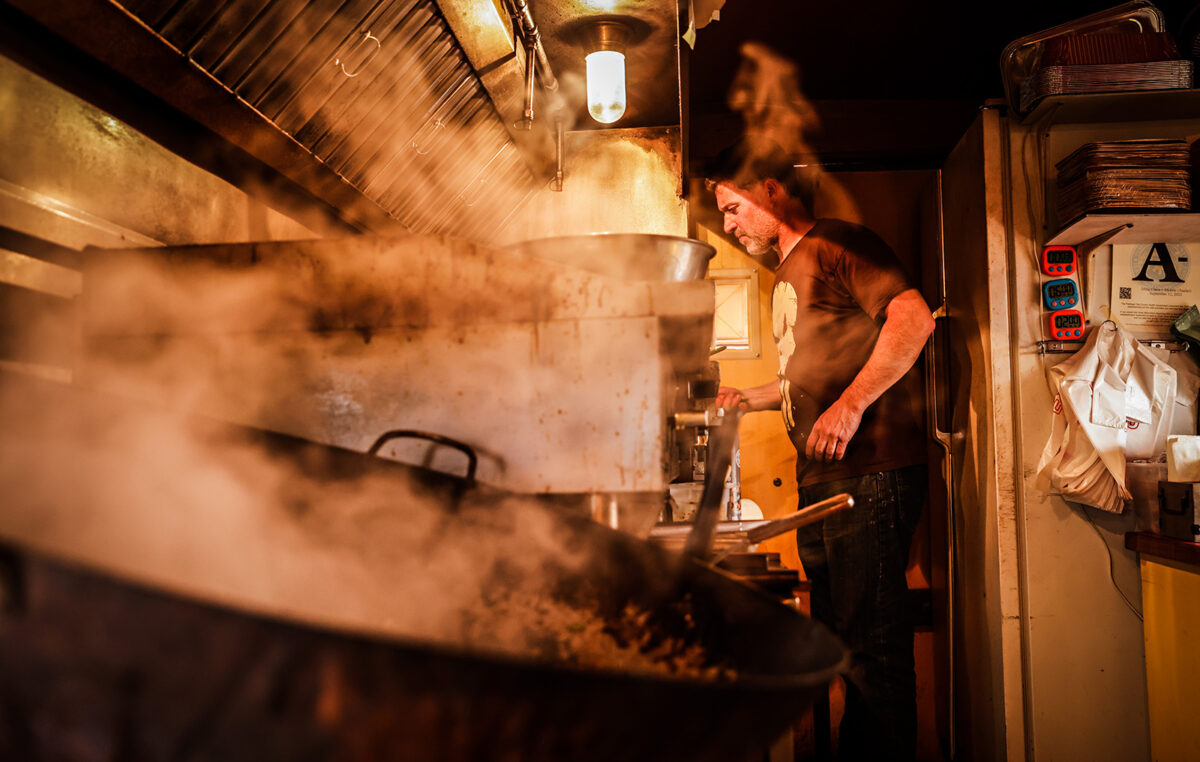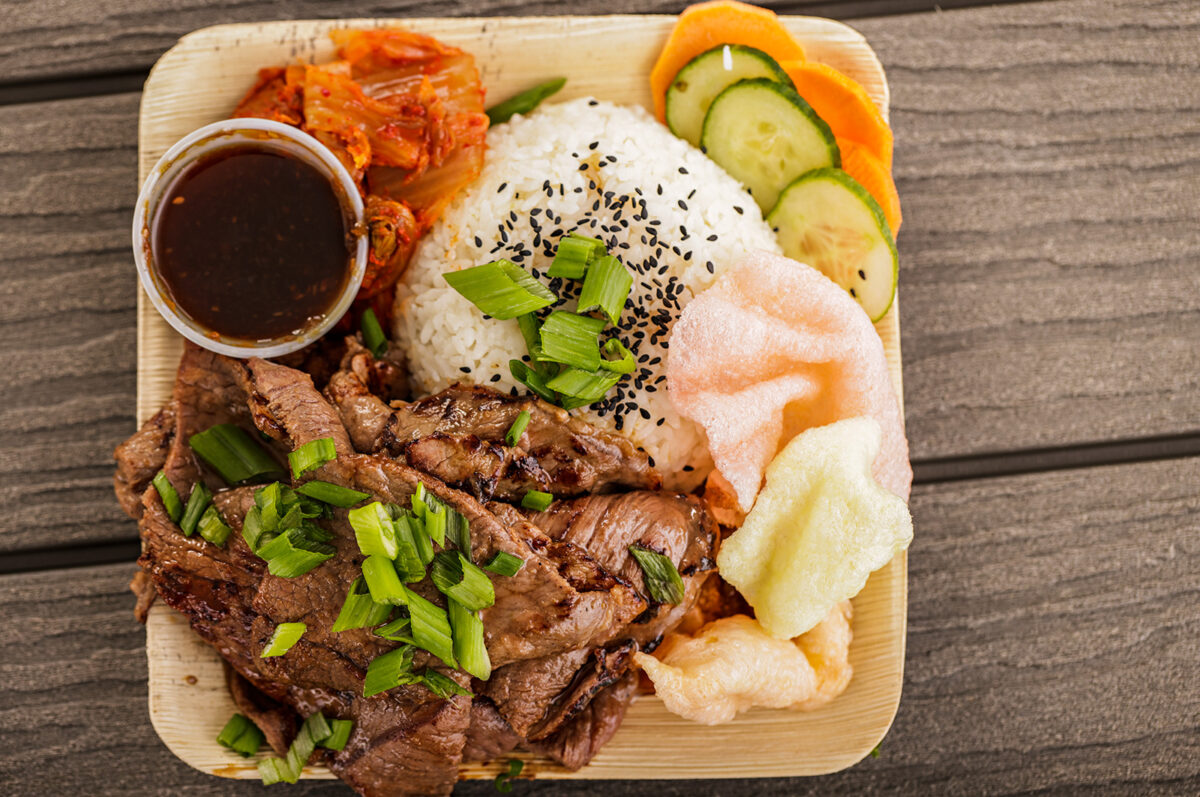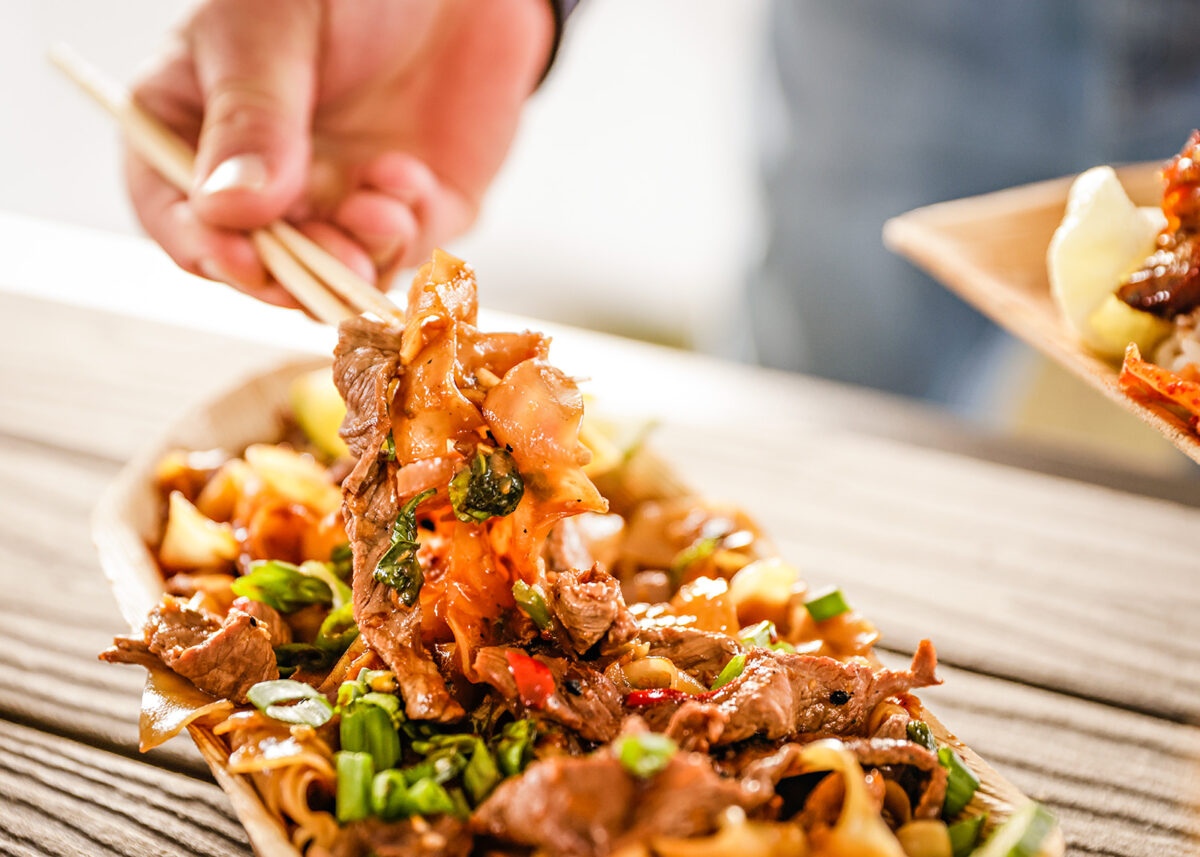Standing over the stove in the Isling Chow food truck kitchen, Issac Incoronato calls the dynamic duo of himself and Nora Batiz “partners in life, partners in kids, and partners in business.”
Incoronato and Batiz are the co-owners of Isling Chow, an Asian-fusion style food truck with a fixed location in Bigfork (22 Swan Way) that serves customers a wide array of noodle, rice and meat dishes, as well as bubble teas, international sodas and desserts. The couple previously ran The Village Roost in downtown Bigfork, and now own and operate The Roost Lodge inn and event space in Somers, as well as Isling Chow.
As Incoronato recently whipped up a lunchtime serving of spicy Greek gyros, the couple recalled their respective journeys in the restaurant industry and the story of their current culinary venture. Incoronato taught himself to cook at a young age as a kid growing up in Asia, where he said he was fundamentally shaped by the cuisines around him. Batiz said she found her food streak a bit later in life, after being raised in a low-income family, where the restaurant world often felt inaccessible.
Now, the duo is bringing what they describe as “different types of cuisines from all around the world” to Bigfork, serving up everything from Korean fried chicken to Indian Samosas in their on-the-go kitchen.
“We really do work well together. We’re huge foodies. We love food. We love what it does for people. We love to feed people,” Batiz said.
Incoronato and Batiz sat down with Flathead Living to discuss the inspiration behind Isling Chow, their extensive menu and what it means to bring new flavors to their community. The following is an edited excerpt from that conversation.

Flathead Living: How did you guys get into cooking and how did you start the food truck?
Issac Incoronato: Food started, for me, living in Taiwan as a kid. My parents worked late, and I was hungry, so I started cooking when I was 12 years old. It was in Asia, so I’ve always been influenced by Asian food. Then, I didn’t want to build houses anymore. I was always in the kitchen. I met [Nora] with one of her friends at my bar and grill in downtown Bigfork, and then we started dating. She came to work at the restaurant, and we immediately became partners.
Nora Batiz: I’ve always been quite a foodie. I didn’t start cooking until like my late 20’s though, because I grew up kind of in poverty. With limited resources, you don’t really have a lot that you could choose from. So that didn’t really come to me until, I would say, my mid-20s when I started getting more and more interested in cooking. I always had been, I had the spark with it. But I think in my early 20s is when I first started taking off with the industry and wanting to be a part of it.
FL: Where did the inspiration for Isling Chow come from?
II: Ever since I started cooking, I’ve been cooking Asian food. Especially here in Montana, there were never any Asian restaurants until recently, I’d say, and they’re not very good, the ones that are here. We started doing this, and we thought we were just going to do it for the summertime, and then people started asking if we’d stay open for the winter. We decided to, and it worked out.
FL: How long did you live abroad?
II: I lived in Taiwan for three years. I lived in Japan for almost three years. We travel all the time, so we go overseas quite a bit. We just got back from Panama, checking out the food scene down there. The restaurants there are phenomenal. Panama City is one of the coolest cities I’ve ever been to. It was really nice.

FL: Why did you open a food truck and not a brick-and-mortar restaurant?
II: We had a restaurant. We couldn’t afford to buy our own building or anything like that, which is usually the biggest deal. Then if you rent something, you’re paying someone else all your profits. So we got out of that. I went back to building houses for a while, and then decided to get this up and going.
NB: This makes it more personal, too. We could move it around if we wanted to. Not that we do, at this point. We’re pretty comfortable here. But it just makes it more personal. We can talk to our clientele, the customers that we have. We can greet them better. We can really know what their wants and needs are. You can’t really do that at a restaurant. It usually gets a little muffled with all the other noises that come with owning a restaurant.

FL: What are your favorite dishes to cook for people?
NB: That’s a really hard one. I think any of our noodle dishes. We usually have a huge, 30-inch wok that sits right here on this fire. Anything that’s wok-fried is my favorite, so any of the soba noodles or drunken noodles. It’s usually my absolute favorite to watch, just because it’s cool to toss it around and add your ingredients in.

FL: Have people been receptive to trying the new dishes that you make?
NB: Oh, absolutely. People, for the most part, call us “the Chinese truck,” I think because they don’t really realize how big and how diverse Asian food can really be. We have maybe two things on our menu that are Chinese. Everything else is Japanese, Korean, Thai. We do a mixture of everything, really. Food from all around the world is what we’d like to stick to, but mainly Asian is what we cater to. So, I think they’re starting to realize how diverse it is. They’re more welcoming, they’re more open to trying new things that they’ve never tried before. That’s really neat to see.
II: I think we’ve got about a 95% conversion rate of curry haters. Ninety-five percent of people that say they don’t like curry, they don’t like coconut, they don’t like those flavors, we challenge them, and they try ours, and they’re sold. They like it. Curry is just another word for sauce. There’s probably 10,000 or more different curry recipes out there. They go from all the way over Africa, to the Middle East, through Asia, up into even Eastern Europe.
NB: I think this place really needed something like this, some kind of fusion, here, to liven everyone’s palate a little bit.

FL: What’s next for Isling Chow?
NB: We’ve had the food truck parked here a little over a year now. We’d like to do more. We’d like to do a kind of international hit on different types of cuisines from all around the world.
II: We’re getting a lot of really good response from all over the valley. We had a couple people in Polson ask us to open up down there, and one in Columbia Falls and a couple Whitefish, trying to get us to branch out. Ideally, the idea is to put one of these in Whitefish, Columbia Falls, Kalispell, Bigfork, maybe Lakeside in the summertime.
NB: We’re hoping in the near future, we can have another one of these somewhere. We get a lot of people who thank us, ‘Thank you for not moving. Thanks for being here. Are you gonna be here the whole summer?’ They’re already planning on us being right here.
